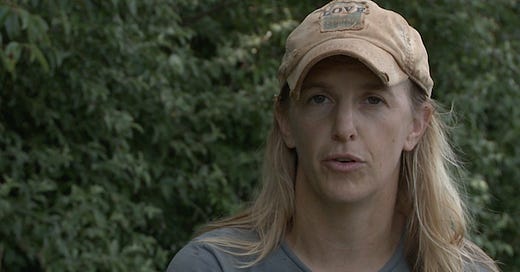After our discussion with Justin and Adam about the unconventional response to Hurricane Helene, we took a short break.
Reconvened for the final talk of the day (focused on strengthening statewide agriculture) with all of us hungrily aware that afterwords the hog would be finished roasting.
Before the talk, we screened a short portrait of Suzanne Karreman:
First met Suzanne at the world premiere of American Meat in Staunton, Virginia. She insisted we bring the film to her hometown of Saxapahaw, North Carolina- one of the coolest small towns in rural America. It’s a place where the gas station has a five-star restaurant with reasonably-priced-locally-sourced food, and the very small main street also has a local butcher and a ludicrously good bar & restaurant. At the end of the storefronts is the coolest event venue (right on the river) appropriately named the Haw River Ballroom. We screened American Meat there in December of 2011 after sharing a big community dinner of pastured pulled pork raised by Suzanne. We also hosted a discussion with Johnny Glosson, Eric Henry and of course Suzanne. Little did we know that fourteen years later we’d be sharing a stage again in Spruce Pine. God works in mysterious ways.
Through Marianne was introduced to Sara Runkel who is the Local Food Program Director at the Carolina Farm Stewardship Association (CFSA) one of the leading non-profits in the state that’s supporting local and organic agriculture. She’s a veteran of connecting farmers with eaters, or put another way, of building real community.
Greg Gunthorp, longtime friend and farmer, provided an out-of-state perspective to the panel. He also roasted the pig waiting for us downstairs.
The discussion was wide ranging and passionate. Suzanne spoke about how dairy farms across the state had been disappearing for many years. How dairy farms used to be at the heart of many rural communities because they provide not only drink and food, but jobs and stability. But that’s disappearing. Her husband Hubert is a vet, and recently had to drive hours to find a vital treatment for a sick cow. Something that would’ve been available any local feed store not too long ago. I brought up that I was curious about getting a dairy cow, she discouraged it. She likened the raising of a dairy cow to the climax species in a forest. It’s easy to grow lettuce, not so easy to procure milk. She shared the ins and outs of how her farm, Reverence Farms, is extremely unusual in that it allows calves to stay on the momma cow while also milking for human consumption. This means that they get half as much milk for the farm. But to Suzanne and Hubert, it’s worth it.
Sara shouted out farmers in the room who had been there with plenty of food for the people of Western North Carolina who had been stranded during the hurricane. Pointed out the resiliency that having homegrown food provides. CFSA had also ensured that instead of expecting farmers to donate sub-prime fruits and veggies to food banks, they were getting paid top dollar. The whole room erupted into applause multiple times.
Greg weighed in that regional food systems were vital for keeping meat on the table, sharing the story of how he started a small slaughter facility, and how the USDA is constantly badgering him with regulations and stipulations that were written for much larger facilities. Things like requiring a separate bathroom and office for the USDA inspector, paid by for the farmer. Things that might make sense in a massive meat plant with tens of thousands of animals running through it daily, but not for a small family run operation that only slaughters a few animals a day.
Before long, our time ran out, and we gleefully went downstairs and stood in line for Greg’s pork and baked beans. Can still taste the goodness now, almost two months later.





I remember, from that discussion, the local Tractor group that buys from farmers at a good price, then sells a portion of what it buys to cover the cost of providing the majority of the fine, fresh food to those in need in the community. How having coolers stocked with tens of thousands of dollars of that food - when the power went out during Helene - provided a resource for anyone and everyone in the area who could get there, when getting food in from anywhere else was about impossible. Another plank in the platform of resiliency, care, connection, creativity, and common sense that can be fostered, with hands, heads, hearts, and history carrying us beyond assumed constraints.
Suzanne was fortunate to be able to pick that lifestyle. Really hard work w/o days off, but rewarding in a way few other careers could ever even be considered.